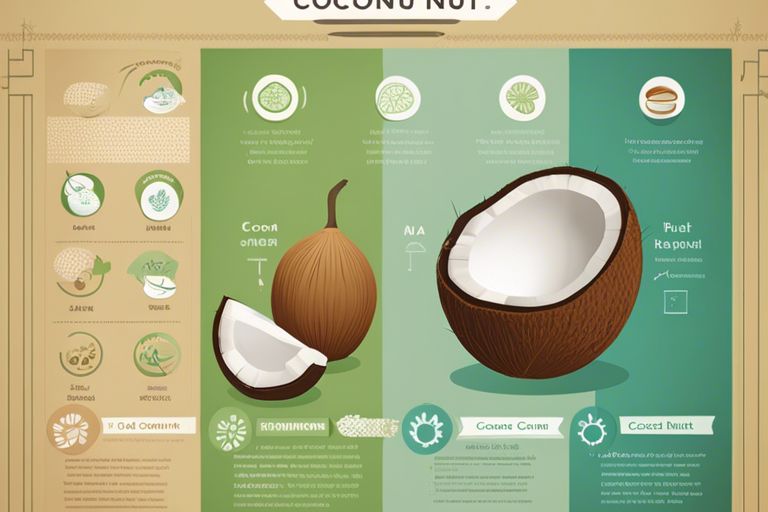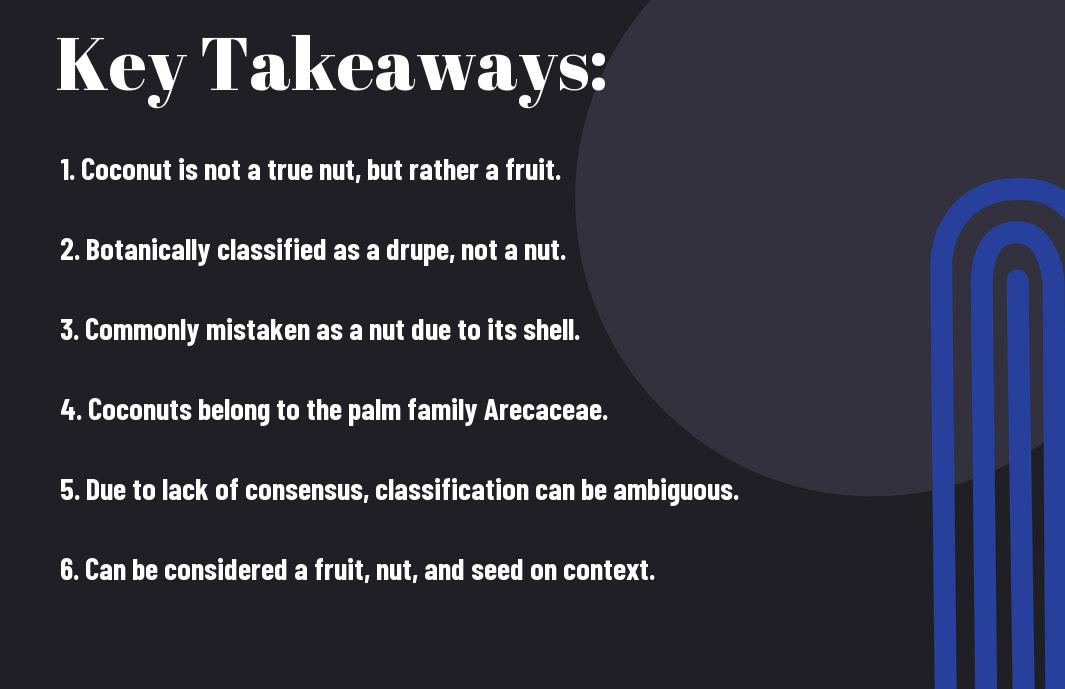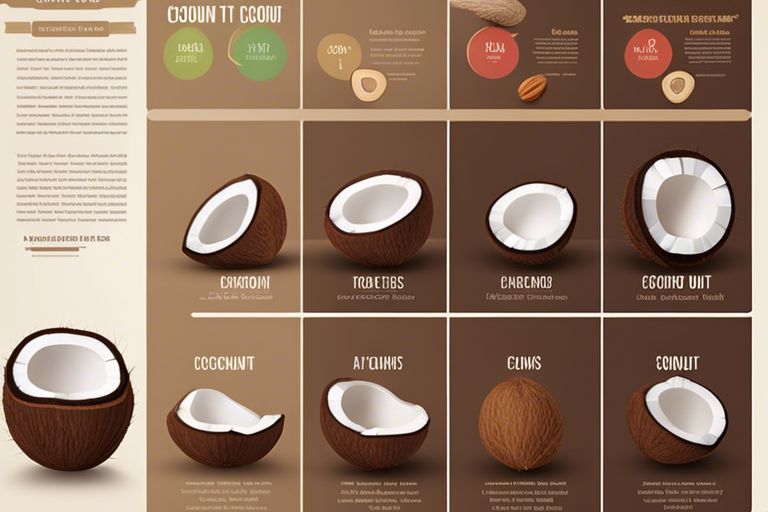Indubitably, the debate over whether a coconut is a nut or a fruit has been ongoing for quite some time. Many individuals are perplexed by this issue and find themselves questioning the accurate classification of the coconut. In this blog post, I will delve into the topic and provide you with crucial information to help you understand whether a coconut is a nut, a fruit, or perhaps even both. You may also visit this website to learn more about this intriguing subject.
Key Takeaways:
- Coconut is a fruit: Despite its name and the hard outer shell, a coconut is actually classified as a fruit, not a nut.
- Botanical classification: Botanically speaking, coconuts are considered drupes, which are a type of fruit with a hard shell surrounding a seed.
- Common misconception: Many people mistake coconuts for nuts due to their hard shell and seed-like interior, but they are in fact fruits.
- Nut allergies: Despite being a fruit, coconuts can still elicit allergic reactions in some individuals who have nut allergies, so caution should be exercised.
- Diverse uses: Coconuts are versatile, with various parts of the fruit used in cooking, skincare products, and even as a source of renewable energy.
The Botanical Classification of Coconut
Before we delve into whether coconut is a nut or a fruit, let’s first understand its botanical classification. The scientific name for coconut is Cocos nucifera and it belongs to the Arecaceae family. It is a member of the palm tree family and is the only species in the genus Cocos.
Is Coconut a Nut?
When it comes to the classification of coconut, it is important to note that it is not a true nut in the botanical sense. While the word “nut” is commonly used to describe coconuts, they are actually classified as a fibrous, one-seeded drupe. The definition of a drupe is a fruit with a hard stony covering enclosing the seed. In the case of a coconut, the familiar hairy, brown exterior is the fibrous husk, inside which is the hard shell that encapsulates the seed, which is the edible part that we commonly refer to as the ‘meat’ or ‘flesh’ of the coconut. So, botanically speaking, coconuts cannot be classified as true nuts.
Is Coconut a Fruit?
Yes, coconuts are indeed classified as a fruit. In botanical terms, a fruit is the mature ovary of a flowering plant, usually containing seeds. The coconut meets this definition as it develops from the ovary of the coconut palm flower and contains a seed. The fleshy part of the coconut that we consume is the endosperm, which is the nourishing tissue that surrounds the seed. Therefore, while coconuts may not fit the traditional image of fruits like apples or oranges, they are classified as such in the botanical world.
The Nutritional Profile of Coconut
Some people often wonder about the nutritional content of coconut and whether it is a healthy choice. The truth is, coconuts are highly nutritious and rich in fiber, vitamins, and minerals. They are especially high in manganese, which is essential for bone health and the metabolism of carbohydrates, proteins, and cholesterol. Coconuts also provide a good source of copper and iron, important for forming red blood cells and maintaining healthy connective tissues.
Health Benefits
Coconuts are a great source of healthy fats, particularly medium-chain triglycerides (MCTs). MCTs are easily digested and have shown to have various health benefits, including improving cognitive function and reducing the risk of heart disease. Additionally, coconut meat and milk are rich in antioxidants, which can help protect your cells from damage caused by free radicals.
Allergen Classification
While coconuts are generally considered a tree nut, they are not considered a major allergen and are not related to other tree nuts like almonds or cashews. However, it is important to note that some individuals may still have allergic reactions to coconuts. If you have a known allergy to tree nuts, it’s crucial to consult with your healthcare provider before consuming coconut-based products to avoid any potential allergic reactions.
The Legal Perspective
Despite the general perception, determining the legal classification of coconut is not as straightforward as it may seem. The legal perspective on whether coconut is a nut or a fruit is crucial, as it affects various regulations and labeling requirements.
FDA Classification
According to the Food and Drug Administration (FDA), coconuts are classified as tree nuts. This classification is important when it comes to food labeling. Under the FDA regulations, coconut must be labeled as a tree nut on food packaging. This means that if you have a tree nut allergy, you should exercise caution when consuming products containing coconut. It’s essential to be aware of this classification, especially if you have a nut allergy, as coconut could trigger a similar allergic reaction.
Allergen Labeling Laws
When it comes to allergen labeling laws, coconuts are considered one of the major food allergens. This means that manufacturers are required to clearly state if a product contains coconut or any of its derivatives. The presence of coconut must be disclosed on food labels, making it easier for consumers to identify and avoid potential allergens. Being aware of this labeling requirement can help you make informed choices when selecting food products, especially if you have a coconut allergy or sensitivity.


To wrap up
After delving into the characteristics and botanical definition of coconuts, it is clear that they are actually classified as a fruit, not a nut. While the common misconception may lead one to believe that coconuts are nuts, their classification as a fruit is based on the criteria of the botanical definition. By understanding the intricate details of the coconut’s structure and reproduction, you can accurately identify it as a fruit. So, the next time you come across a coconut, you can confidently refer to it as a fruit, not a nut.
Is Coconut a Nut or Fruit – What’s the Accurate Classification?
Q: Is a coconut a nut or a fruit?
A: Despite its name, a coconut is actually classified as a fruit rather than a nut. It is a one-seeded drupe, which is a type of fruit that has a hard outer layer and a fleshy inner part surrounding a single seed.
Q: Why is a coconut considered a fruit and not a nut?
A: The confusion arises from the fact that the term “nut” is often used in a culinary sense, but in botanical terms, a nut is a dry, hard-shelled fruit that does not split open to release its seed. Coconuts, on the other hand, have a fleshy outer layer and do split open to reveal their seed, making them a fruit.
Q: Are there any health implications of the classification of coconuts?
A: While the classification of coconuts may not have a direct impact on their health benefits, understanding their botanical classification can help in better understanding their nutritional profile and potential allergenic properties for those with nut allergies.
Q: Can coconuts be safely consumed by individuals with nut allergies?
A: While coconuts are not true nuts, they do contain a potential allergen known as a coconut protein, which can trigger allergic reactions in some individuals with nut allergies. It is important for those with nut allergies to consult with a healthcare provider before consuming coconuts or coconut-derived products.
Q: How should coconuts be labeled in the context of food allergies?
A: Due to the potential allergenic properties of coconuts for individuals with nut allergies, they are commonly labeled as “tree nut” allergens on food packaging in order to alert consumers with nut allergies to the potential risk of consuming coconut-derived products.









Leave a comment